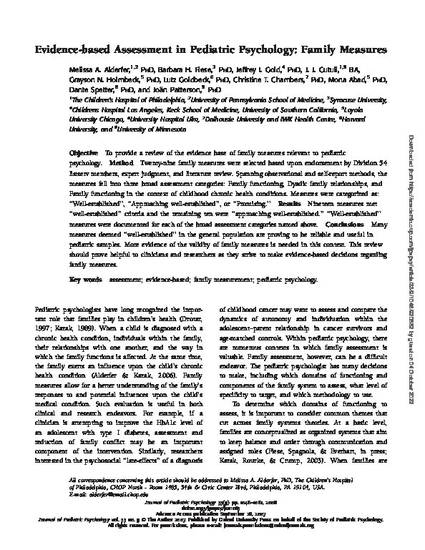
Article
Evidence-based Assessment in Pediatric Psychology: Family Measures
Journal of Pediatric Psychology
(2008)
Abstract
Objective To provide a review of the evidence base of family measures relevant to pediatric psychology. Method Twenty-nine family measures were selected based upon endorsement by Division 54 listserv members, expert judgment, and literature review. Spanning observational and self-report methods, the measures fell into three broad assessment categories: Family functioning, Dyadic family relationships, and Family functioning in the context of childhood chronic health conditions. Measures were categorized as: “Well-established”, “Approaching well-established”, or “Promising.” Results Nineteen measures met “well-established” criteria and the remaining ten were “approaching well-established.” “Well-established” measures were documented for each of the broad assessment categories named above. Conclusions Many measures deemed “well-established” in the general population are proving to be reliable and useful in pediatric samples. More evidence of the validity of family measures is needed in this context. This review should prove helpful to clinicians and researchers as they strive to make evidence-based decisions regarding family measures.
Keywords
- assessment,
- evidence-based,
- family measurement,
- pediatric psychology
Disciplines
Publication Date
2008
Citation Information
Alderfer, M.A., Fiese, B., Gold, J.I., Cutuli, J. J., et al. (2008). Evidence-Based Assessment in Pediatric Psychology: Family Measures. Journal of Pediatric Psychology, 33, 1046-1061.
